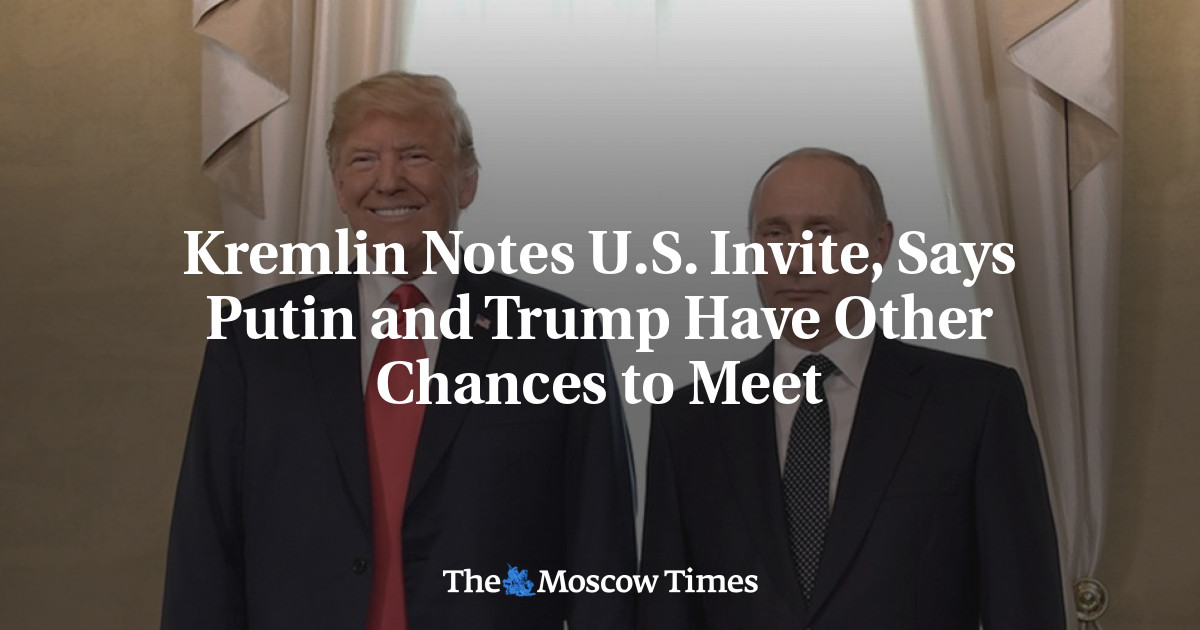


The Kremlin has stated that Russian President Vladimir Putin is open to a meeting with US President-elect Donald Trump after his inauguration on January 20. This comes after Trump's recent comments about understanding Russia's concerns regarding Ukraine joining NATO. Trump also criticized President Joe Biden's handling of negotiations, saying it could lead to escalation of the ongoing conflict. Trump had previously mentioned plans to speak with Putin and Ukrainian President Volodymyr Zelensky to address the situation.
Introduction
Recent statements by the Kremlin have indicated that Russian President Vladimir Putin is open to a meeting with US President-elect Donald Trump after his inauguration on January 20. This potential meeting comes amidst growing tensions between the US and Russia, particularly regarding Ukraine's aspirations to join NATO.
Background
Russia has long opposed Ukraine's membership in the Western military alliance, viewing it as a threat to its security interests. In 2014, Moscow annexed the Crimean Peninsula and backed separatists in eastern Ukraine, leading to an ongoing conflict.
US involvement in the Ukraine crisis has been significant, with the Biden administration imposing sanctions on Russia and providing military aid to Ukraine. However, President Trump has repeatedly expressed skepticism about Ukraine's NATO aspirations and has criticized President Biden's handling of the negotiations.
Trump's Statements
Trump's recent comments have further strained relations with Ukraine and NATO. In an interview, Trump said he could "understand" Russia's concerns about Ukraine joining NATO. He also said that the US should not be "provoking" Russia.
These statements have been met with criticism from Ukraine and NATO allies, who view them as a departure from the US's traditional support for Ukraine's sovereignty.
Kremlin's Response
The Kremlin's announcement that Putin is open to a meeting with Trump is a significant development. It suggests that Russia is interested in exploring a possible rapprochement with the incoming US administration.
However, it is unclear what the agenda for such a meeting would be or what concrete outcomes could be achieved. The Kremlin has said that the meeting would only take place after Trump's inauguration, which suggests that Putin is looking to engage with the new administration on a fresh footing.
FAQs
1. Why is Russia opposed to Ukraine joining NATO?
Russia sees Ukraine's potential NATO membership as a threat to its security interests. It believes that NATO expansion close to its borders would give the West undue military advantage and undermine its regional influence.
2. What is the ongoing conflict in eastern Ukraine?
Following Russia's annexation of Crimea in 2014, separatists in eastern Ukraine, backed by Russia, have been fighting Ukrainian government forces. The conflict has claimed thousands of lives and displaced millions of people.
3. How has the US responded to the Ukraine crisis?
The US has imposed economic sanctions on Russia and provided military aid to Ukraine. The Biden administration has been particularly vocal in its support for Ukraine's sovereignty and territorial integrity.
4. What has Trump said about Ukraine and NATO?
Trump has expressed skepticism about Ukraine's NATO aspirations and has suggested that the US should not be "provoking" Russia. His comments have been met with criticism from Ukraine and NATO allies.
5. What could come from a meeting between Trump and Putin?
The agenda for a potential meeting between Trump and Putin is unclear. Possible outcomes could include a discussion of sanctions, the Ukraine conflict, or other areas of mutual concern. However, given the complex dynamics between the US and Russia, any concrete outcomes remain uncertain.

A stampede at the Kasibugga Venkateswara Swamy Temple in Andhra Pradesh has left 10 dead and two injured. The temple had recently reopened and was experiencing high footfall due to a festival. Home Minister Vangalapudi Anitha has ordered a thorough investigation into the causes of the tragedy and has promised strict measures to prevent similar incidents in the future.

India and the United States have strengthened their already strong ties by signing a 10-year framework for their major defense partnership. The agreement, signed during a bilateral meeting between the two countries' defense ministers, emphasizes the importance of this partnership in maintaining a free and open Indo-Pacific region. This marks a significant step in solidifying the bond between India and the US in the defense sector.

In preparation for a major tri-service military drill, India has issued Notices to Airmen (NOTAM) for the entire northeastern region that borders China, Bhutan, Myanmar, and Bangladesh. The first set of exercises will commence in November and continue through January, signaling enhanced operational readiness for the Indian Air Force (IAF). This move is significant as the Northeast remains a sensitive theater, making up the boundary with four countries, including China. The upcoming IAF exercises aim to strengthen India's air dominance, effectively preparing for any potential challenges along the western frontier with Pakistan.

India will conduct a 10-day military exercise in Rajasthan and Gujarat involving the Army, Air Force, and Navy to showcase its operational readiness following Operation Sindoor earlier this year. The exercise, announced through a NOTAM, features advanced military technologies and emphasises the integration of speed, firepower, and precision in desert warfare conditions. It comes amidst heightened tensions with Pakistan and a renewed focus on maintaining military readiness along the border.

Jammu and Kashmir police have filed an FIR against a group of Christian missionaries in Kathua district for allegedly attempting religious conversions through financial incentives. This comes after a video surfaced online showing the missionaries being attacked and their vehicle vandalized by villagers. The incident has sparked outrage and protests from local Hindu groups, demanding action against the accused missionaries. One accused, Ravindra Singh Thela, has been arrested while the main accused, Vivek Soni, is still at large. The police have also suspended eight personnel for failing to stop the attack.

US Vice President JD Vance, who converted to Catholicism in 2019, has revealed that he hopes his Hindu-raised wife, Usha Vance, will eventually embrace Christianity. However, he clarifies that their interfaith marriage is built on mutual respect and understanding, and that Usha has complete freedom of choice in matters of faith. The couple has found a balanced way to manage their interfaith household, with their children attending a Christian school and given the choice to be baptized.

US President Donald Trump has expressed optimism about reaching a trade deal with China "pretty soon" after a meeting with Chinese President Xi Jinping in South Korea. In addition to announcing lower tariffs on Chinese imports, Trump also stated that the issue over US access to rare earths has been resolved. However, there has been no official response from Beijing and the final decision on the sale of Chinese-owned TikTok's US operations is still pending. Analysts see these developments as a breakthrough in the ongoing trade tensions between the two countries. Our correspondents provide insight on the discussions between the two leaders and speculate on why Xi may have felt confident walking into the meeting.

At the Asia-Pacific Economic Cooperation (APEC) Summit in South Korea, Chinese President Xi Jinping and US President Donald Trump met for their first in-person talks in several years. Despite past frictions, Xi called for closer cooperation between the two largest economies in the world, emphasizing the importance of being "partners and friends." Acknowledging Trump's peace efforts in the Middle East, Xi commended his contributions and praised him as a "tough negotiator." Trump also expressed optimism for a productive discussion on trade and global security.

In a historic event, Prime Minister Shri Narendra Modi addressed the Global Maritime Leaders Conclave and chaired the Global Maritime CEO Forum at India Maritime Week 2025 in Mumbai, welcoming participants from over 85 countries. With major shipping giants, startups, policymakers, and innovators in attendance, the summit showcased India's advancements in the maritime sector, such as the replacement of outdated colonial laws with modern ones and the recognition of large ships as infrastructure assets. Amidst global tensions, India stands as a symbol of strategic autonomy and inclusive growth, ready to take on a leading role in the world's rough seas.

Indian Prime Minister Narendra Modi has declared that the next generation of Goods and Services Tax (GST) reforms will begin on the first day of the Navratri festival. This major economic overhaul aims to streamline the current GST system and support businesses, especially small and medium enterprises. In other news, the National Human Rights Commission (NHRC) and Ministry of External Affairs (MEA) are collaborating to organize a six-day program in New Delhi to strengthen executive capacity for International Technical and Economic Cooperation (ITEC). Lastly, the upcoming BIRC 2025 conference will take place at the Bharat Mandapam in New Delhi.